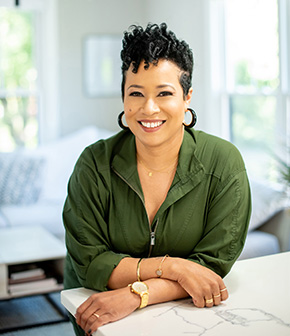On this episode of Diversity Be Like, host Sequoia Houston talks to Amber Cabral. She is a global inclusion strategist, certified coach, and author of an international best-selling book - Author of Allies and Advocates.
Show Notes
About Our Guest

AMBER CABRAL
Author, Diversity Strategist
A people passionate, idea-generating, strategist, Amber Cabral develops inclusive leaders and cultivates diverse and equitable cultures for Fortune 500 Organizations with as much as $50B in sales and small 5-person organizations. She also helps innovative start-up CEOs and non-profit Executive Directors with operations fundamentals and business strategy to maximize efficiency, organization, and productivity. She is the author of the book Allies and Advocates: Creating an Inclusive and Equitable Culture, which can be found on Amazon.
3 Key Points
- Sequoia and Amber discuss if race does not matter, why not take it out from applications and other vital forms?
- Listeners will get to know Amber’s view on the topic “What would you say to a business leader who wants to stand in solitary and marginalized communities and does not know where to start?”
- Amber is doing diversity and inclusion work for the past 20 years. She shares her viewpoint on - Since starting her business, what are the positive changes she has witnessed over the years?
Episode Highlights:
- Amber gives a power-packed introduction and talks about the multitude of experiences she has.
- Be it working with one of the world's largest company Walmart to her honorary associations as Chair of Brown Girls Do Ballet®, she shares insights on her journey so far.
- When it comes to the operational definition of Amber's work, her take on ‘Bias’ is that it is non-stop, which can be tagged as a preference inclination or prejudice.
- She stresses that Bias is something that happens all the time; it is not bad instead, it is what people do.
- Amber gives an excellent example about how at times, bias can be a good thing.
- She adds that it is important to note that “What actions you take as a result of the bias that goes on in your life?”
- Sequoia upped the bar by asking the next question, “How do you define culture?”
- Amber explains that when it comes to culture, it is about “What do people say about the experience of being at a place?”
- She further adds that “You are not smart about all the things, so when you are learning it is helps to have a straightforward ways of thinking.”
- Next, Sequoia asks Amber to share her views on Allies and Advocates, also enquired whether they are the same thing?
- Amber denies the similarity and explains that Allies are those who have taken out the time to think about their privileges and show empathy towards others.
- On the other hand, Advocacy’s take on privilege and power is different, it is about challenging and dismantling the system.
- Sequoia askes, “Currently on this journey, where do you think we are?” “Are we at tolerance, understanding acceptance or celebration?”
- Amber answers that she sees that people are moving beyond ‘Tolerance’ and inclining more towards ‘Awareness’.
- Sequoia points out that several companies want to take a stand on the important issue related to racial discrimination or justice at present.
- Amber beautifully explains the importance of working on key issues to gain an impact.
- Sequoia shares some funny personal experiences and asks a related question, “What can employees do to help an organization make inclusion actionable?” “What can leaders do to support employees who want to have this conversation?”
- Many times, folks don’t know what you need unless they see what is coming at them.
- Amber talks about how policies about inclusion, diversity, and equality are important in organizations.
- The host asks, “What do you want your book’s last thing legacy to be?” Amber talks about her idea to write a simple and accessible book and not sound too complicated.
Tweetable Quotes:
- “It is not bias or stereotype, but it is all about what you do” - Sequoia Houston
- “Allyship is more about the people whereas, and Advocacy is more about the system” - Amber Cabral
- “It’s human nature to categories, so removing a specific category from a form does not solve any problem.” - Amber Cabral
- “The biggest thing that an organization can do if they want to make an impact – it is to know what the impact is. If it is not allyship, then what is the outcome or impact that you want?” - Amber Cabral
- “Everybody is seen doing a good job, but the important question is - Are you also making an impact?” - Amber Cabral
Resources Mentioned:
Amber Cabral: Instagram | Facebook | Twitter | LinkedIn | Website
Listen On
Also In Season 1
-

Diversity Be Like...Love, Life and Legacy
In this season finale episode, Sequoia Houston talks to Paul C. Brunson – A -

Diversity Be Like...The Model Minority Myth
In this episode, Sequoia Houston talks to Jay Kim,President and CEO of AAAZ -

Diversity Be Like...The Expat Life
On this episode of Diversity Be Like, host Sequoia Houston talks to Phil ak -

Diversity Be Like...Not Speaking the Queen's English
In this episode, Sequoia Houston talks to Doctor Alaina Davis. She is a com

